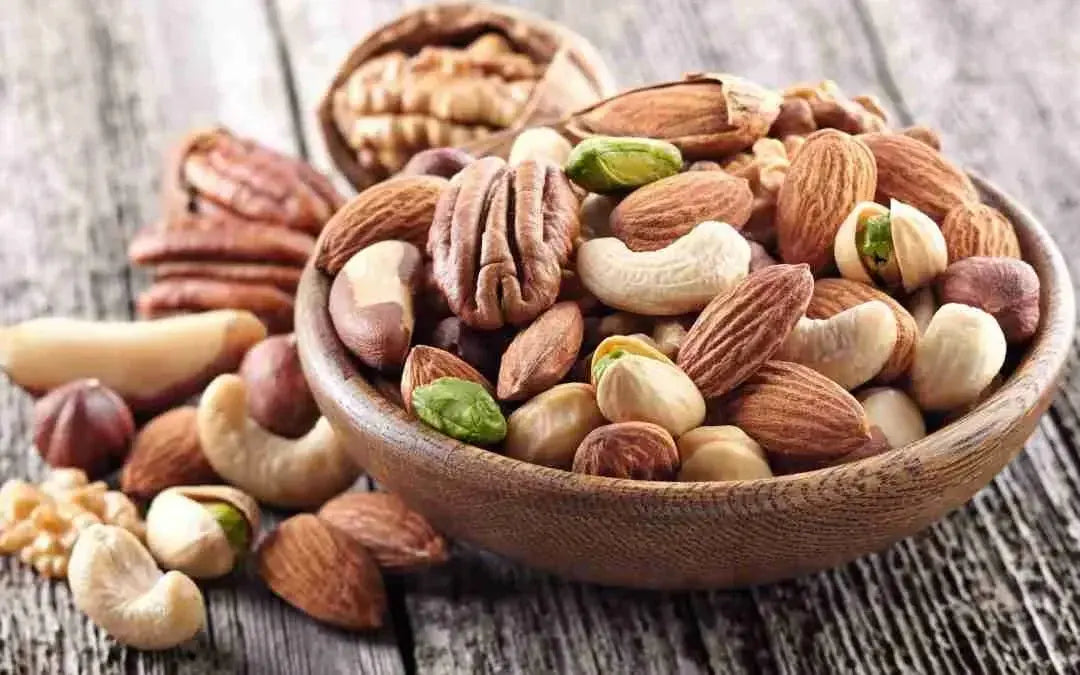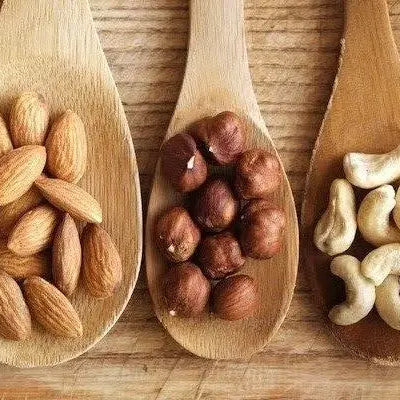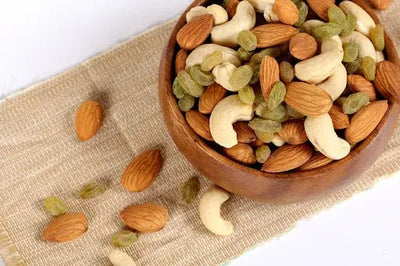Nuts are highly nutritious foods that, in addition to being delicious, provide a good amount of plant-based protein. Incorporating them into our daily diet can be an excellent way to increase protein intake, especially for those looking for alternatives to animal-based proteins. In this article, we'll explore which nuts contain the most protein and how they can benefit our health.
Why are proteins important?
Proteins are essential macronutrients that perform multiple functions in the body, such as:
- Tissue construction and repair : These are essential for the growth and repair of muscles, skin, and other tissues.
- Production of enzymes and hormones : They participate in the synthesis of digestive enzymes and hormones that regulate bodily processes.
- Immune function : They help in the formation of antibodies that fight infections.
Adequate protein intake is vital to maintaining optimal health and preventing various diseases.
Nuts with the highest protein content
Below we detail the nuts that stand out for their high protein content:
1. Peanuts
Protein content : Approximately 25 grams of protein per 100 grams.
Although botanically they are legumes, peanuts They are commonly considered nuts due to their nutritional characteristics and use in food. They are an excellent source of vegetable protein and contain antioxidants such as resveratrol. Furthermore, their versatility allows them to be consumed in a variety of ways, such as in butter without added sugar.
2. Almonds
Protein content : Between 18 and 20 grams of protein per 100 grams.
The almonds They are rich in vitamin E, calcium and fiber, making them a healthy snack that also promotes cardiovascular and bone health.
3. Pistachios
Protein content : Approximately 20 grams of protein per 100 grams.
The pistachios They are low in calories and fat, but rich in vitamin B6, which is essential for multiple bodily functions, including blood sugar regulation and hemoglobin formation.
4. Cashews
Protein content : Around 17 grams of protein per 100 grams.
In addition to their protein content, cashews They provide vitamin K, magnesium and manganese, nutrients that support bone and metabolic health.
5. Pine nuts
Protein content : About 17 grams of protein per 100 grams.
Pine nuts are rich in magnesium, iron, and vitamins K and E, nutrients that contribute to cardiovascular health and the immune system.
6. Nuts
Protein content : Approximately 15 grams of protein per 100 grams.
The walnuts They are known for their high content of omega-3 fatty acids, which are beneficial for heart and brain health.
7. Hazelnuts
Protein content : Between 12 and 15 grams of protein per 100 grams.
The hazelnuts They are rich in healthy fats, fiber, and antioxidants, making them a nutritious option to include in your daily diet.
How to incorporate nuts into your daily diet
Incorporating nuts into your diet is simple and delicious. Here are some ideas for how to do it:
1. As a healthy snack
Carry a portion of nuts in your purse or backpack to snack on between meals. They're a practical and nutritious option that will help you maintain energy throughout the day.
2. In salads and main dishes
Add flaked almonds or chopped walnuts to your salads for a crunchy touch and increased nutritional value. You can also incorporate them into pasta dishes, rice dishes, or stews.
3. In pastries and desserts
Use almond flour in your baking recipes or add hazelnuts and pistachios to your favorite desserts to enhance their flavor and protein content.
4. In creams and butters
Prepare nut butters, such as peanut butter wave almond cream , for spreading on toast or as an ingredient in smoothies and sauces.
How nut protein compares to animal protein
- Proteins in nuts : They're an excellent option for vegetarians and vegans, as they provide plant-based protein. However, it's necessary to combine different plant-based sources to obtain all the essential amino acids.
- Animal proteins : These are complete sources of protein, making them ideal for those looking for a quick and complete supply of essential amino acids, such as athletes or people trying to increase their muscle mass.
Nuts are a healthy and sustainable option for plant-based protein, while animal proteins are better suited for those who need a complete supply of essential amino acids. The choice between the two will depend on individual needs and dietary goals.
Considerations when consuming nuts
Although they are very beneficial, nuts should be consumed in moderation due to their high caloric value. It is recommended to choose natural or roasted versions without added salt or sugar. It is also important to store them in a cool, dry place to prevent them from going rancid. People with allergies should avoid them and check the labels of processed products to prevent cross-contamination.
Conclusion
Nuts are an excellent source of plant-based protein, as well as providing healthy fats, fiber, vitamins, and essential minerals. Incorporating them into your daily diet in a balanced way can help improve cardiovascular health, digestion, and physical performance.
If you're looking for a delicious and natural protein alternative, nuts are an ideal choice. Include them in your diet and enjoy their benefits!






Leave a comment
This site is protected by hCaptcha and the hCaptcha Privacy Policy and Terms of Service apply.